Baudelaire Contra Benjamin
Politics, Literature, and Film
Series Editor: Lee Trepanier, Saginaw Valley State University
The Politics, Literature Film series is an interdisciplinary examination of the intersection of politics with literature and/or film. The series is receptive to works that use a variety of methodological approaches, focus on any period from antiquity to the present, and situate their analysis in national, comparative, or global contexts. Politics, Literature, & Film seeks to be truly interdisciplinary by including authors from all the social sciences and humanities, such as political science, sociology, psychology, literature, philosophy, history, religious studies, and law. The series is open to both American and non-American literature and film. By putting forth bold and innovative ideas that appeal to a broad range of interests, the series aims to enrich our conversations about literature, film, and their relationship to politics.
Advisory Board
Richard Avaramenko, University of Wisconsin-Madison
Linda Beail, Point Loma Nazarene University
Claudia Franziska Brhwiler, University of St. Gallen
Timothy Burns, Baylor University
Paul A. Cantor, University of Virginia
Joshua Foa Dienstag, University of California at Los Angeles
Lilly Goren, Carroll University
Natalie Taylor, Skidmore College
Ann Ward, University of Regina
Catherine Heldt Zuckert, University of Notre Dame
Recent Titles
Miltons Socratic Rationalism: The Conversations of Adam and Eve in Paradise Lost, by David Oliver Davies
Walker Percy and the Politics of the Wayfarer, by Brian A. Smith
Romanticism and Civilization: Love, Marriage and Family in Rousseaus Julie, by Mark Kremer
Aldous Huxley: The Political Thought of a Man of Letters, by Alessandro Maurini
Sinclair Lewis and American Democracy, by Steven Michels
Liberty, Individuality, and Democracy in Jorge Luis Borges, by Alejandra M. Salinas
Philip Roth and American Liberalism: Historical Content and Literary Form in the Later Works, by Andy Connolly
Seeing through the Screen: Interpreting American Political Film, by Bruce E. Altschuler
Cowboy Politics: Myths and Discourses in Popular Westerns from The Virginian to Unforgiven and Deadwood, by John S. Nelson
Beyond Free Speech and Propaganda: The Political Development of Hollywood, 19071927, by John D. Steinmetz
Politics, Hollywood Style: American Politics in Film from Mr. Smith to Selma, by John Heyrman
Civil Servants on the Silver Screen: Hollywoods Depiction of Government and Bureaucrats, by Michelle C. Pautz
The Pursuit of Happiness and the American Regime: Political Theory in Literature, by Elizabeth Amato
Imagination and Environmental Political Thought: The Aftermath of Thoreau, by Joshua J. Bowman
The American Road Trip and American Political Thought, by Susan McWilliams Barndt
Flattering the Demos: Fiction and Democratic Education, by Travis Smith and Marlene Sokolon
Soul of Statesmanship: Shakespeare on Nature, Virtue, and Political Wisdom, by Khalil M. Habib and L. Joseph Hebert Jr.
The United States Constitution in Film: Part of Our National Culture, by Eric Kasper and Quentin Vieregge
Short Stories and Political Philosophy: Power, Prose, and Persuasion, by Erin A. Dolgoy, Kimberly Hurd Hale, and Bruce Peabody
Human Nature and Politics in Utopian and Anti-Utopian Fiction, by Nivedita Bagchi
Wonder and Cruelty: Ontological War in Its a Wonderful Life, by Steven Johnston
Rabelaiss Contempt for Fortune: Pantagruelism, Politics, and Philosophy, by Timothy Haglund
The Coen Brothers and the Comedy of Democracy, by Barry Craig and Sara MacDonald
Popular Culture and the Political Values of Neoliberalism, by George A. Gonzalez
The Final Frontier: International Relations and Politics through Star Trek and Star Wars, by Joel R. Campbell and Gigi Gokcek
We Govern by Tenderness: Flannery OConnor and the Perils of Modern Political Thought in America, by Jerome C. Foss
The Politics of Twin Peaks, edited by Amanda DiPaolo and James Clark Gillies
AIDS-Trauma and Politics: American Literature and the Search for a Witness, by Aimee Pozorski
Baudelaire Contra Benjamin: A Critique of Politicized Aesthetics and Cultural Marxism, by Beibei Guan and Wayne Cristaudo
Baudelaire Contra Benjamin
A Critique of Politicized Aesthetics and Cultural Marxism
Beibei Guan
Wayne Cristaudo
LEXINGTON BOOKS
Lanham Boulder New York London
Published by Lexington Books
An imprint of The Rowman & Littlefield Publishing Group, Inc.
4501 Forbes Boulevard, Suite 200, Lanham, Maryland 20706
www.rowman.com
6 Tinworth Street, London SE11 5AL
Copyright 2019 by The Rowman & Littlefield Publishing Group, Inc.
All rights reserved. No part of this book may be reproduced in any form or by any electronic or mechanical means, including information storage and retrieval systems, without written permission from the publisher, except by a reviewer who may quote passages in a review.
British Library Cataloguing in Publication Information Available
Library of Congress Cataloging-in-Publication Data
Names: Guan, Beibei, 1980 author. | Cristaudo, Wayne, 1954 author.
Title: Baudelaire contra Benjamin : a critique of politicized aesthetics and cultural Marxism / Beibei Guan, Wayne Cristaudo.
Description: Lanham, Maryland : Lexington Books, [2019] | Series: Politics, literature, and film | Includes bibliographical references and index.
Identifiers: LCCN 2019014598 (print) | LCCN 2019018511 (ebook) | ISBN 9781498595087 (electronic) | ISBN 9781498595070 (cloth : alk. paper)
Subjects: LCSH: Baudelaire, Charles, 18211867Criticism and interpretation. | Benjamin, Walter, 18921940. | Politics and literature.
Classification: LCC PQ2191.Z5 (ebook) | LCC PQ2191.Z5 G76 2019 (print) | DDC 841/.8dc23
LC record available at https://lccn.loc.gov/2019014598
 TM The paper used in this publication meets the minimum requirements of American National Standard for Information Sciences Permanence of Paper for Printed Library Materials, ANSI/NISO Z39.48-1992.
TM The paper used in this publication meets the minimum requirements of American National Standard for Information Sciences Permanence of Paper for Printed Library Materials, ANSI/NISO Z39.48-1992.
Printed in the United States of America
To Wendy Baker
Preface
As is evident in the listings of literary studies by academic publishers, or in web displays of interests, publications and subjects offered in university literary departments, literary studies today typically requires the subjection of literature to ethico-political considerations. One of the most important pioneering advocates of that position was Walter Benjamin, with his reading of Baudelaire being an iconic performance of the politicization of aesthetics. His work was also a pioneering example of the deployment of Marxism in the cultural critique of modernity.
Benjamins reading of Baudelaire as a social critique of modernity has had a huge impact upon Baudelaires reception from the latter part of the twentieth century until now, with a plethora of studies either directly on Benjamin and modernity or on themes that take their point of departure from Benjamins analysis. However, the price for accepting Benjamins rendering of Baudelaire as a problematic ally (lacking in a correct political consciousness) of a modernity-critique, is a heavy one that requires putting aside much of what we consider most fascinating about Baudelaires insights and aesthetic expressions into the modern world and the modern self. Baudelaires subject is the human condition and he is arguably a more profound guide for exploring the modern soul than Benjamin. This is the idea guiding this book. Obviously people do not all agree about what insights are profound, and all we can do is present insights of Baudelaire which we consider to have existential philosophical significance and let the reader decide.

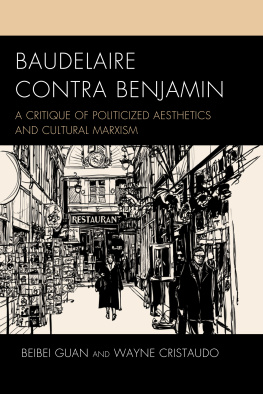
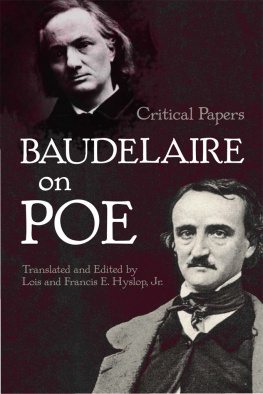
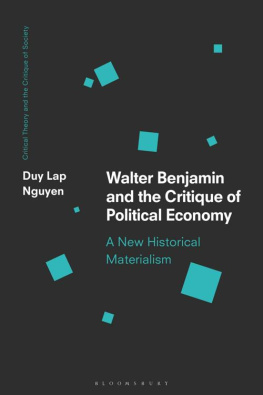
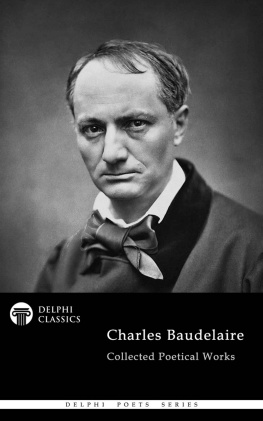


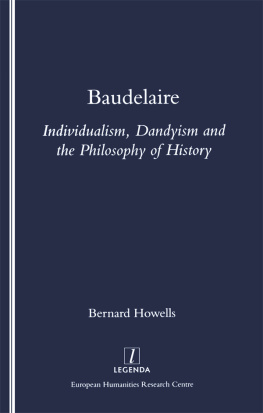

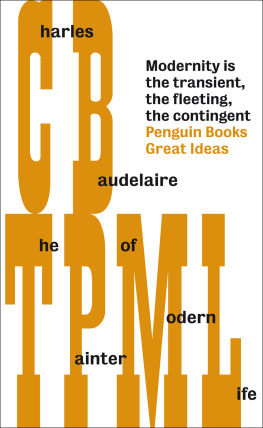

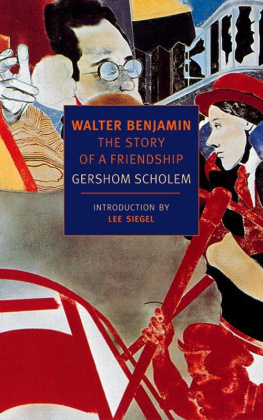

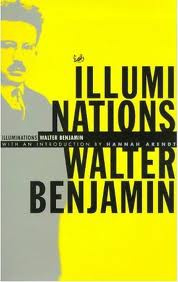
 TM The paper used in this publication meets the minimum requirements of American National Standard for Information Sciences Permanence of Paper for Printed Library Materials, ANSI/NISO Z39.48-1992.
TM The paper used in this publication meets the minimum requirements of American National Standard for Information Sciences Permanence of Paper for Printed Library Materials, ANSI/NISO Z39.48-1992.